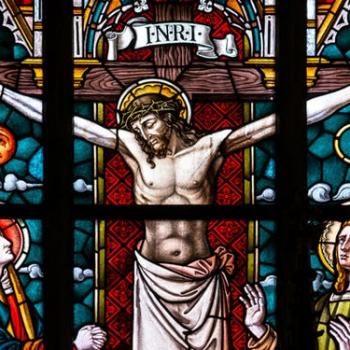The Year of Faith has been my theme here for weeks, but today, I'm talking about my years of faith, together with one man: My husband of thirty years, Bob.
What about Bob? We met in high school. Bob became a loyal and faithful friend. We did not date in high school, but I remember his counsel after my then-boyfriend broke up with me in a rather humiliating fashion. Bob told me that guy was not good enough for me, that I deserved better. He said it in a respectful way that didn't ridicule me for making a foolish choice or that didn't put down the other guy. But his concern for me touched my heart.
Bob and I were guitar buddies, a duo always strumming, and singing. But we had more than music in common.
We both had faith in Jesus. We took different paths to get there, but we both had church-going parents who sent us to Catholic schools, and taught us to serve our respective communities. So that's where our friendship grew—at school, and through many church-sponsored ministries that needed our musicianship.
We also found each other at morning Mass. We learned to pray for each other and with each other outside of Mass too.
The other night we were reminiscing about our courtship during our college years. Before us sat a box of cards and letters from those days. We flipped through our wedding photo as we listened to a scratchy sounding old cassette tape. Someone—at the last minute—brought a tape recorder to our wedding Mass. Who knew that person would bless us thirty years later—or that the technology would somehow still hold up?
People ask what makes our love special, or what "works" for us, and we tell them: long before we fell in love with each other, we fell in love with Jesus. There's an old proverb in Scripture that says, "A threefold cord is not quickly broken" (Eccl.4:12). Bishop Fulton Sheen wrote a whole book on the subject, arguing that it takes three to get married, and we believe it.
We have faith in God, and faith in each other. When we said our marriage vows in the church that crisp fall morning in 1982, we knew we would vow for life . . . and that what we lacked in our own strength would be made up for by grace.
Talk to any Catholic couple married for a few decades or more and the subject of grace is bound to come up. They may not always use the word itself. It might be their reference to "God only knows" or an indescribable or halting acknowledgement of something that is bigger and grander than they are. But what they will say next is also true: that this love has changed them, made them better, even transformed them.
There is a glue that is stronger than our human love—it is divine grace. Sometimes we think it is just because we were fortunate enough to marry someone better than ourselves—that we lucked out—or discovered someone who believes the best in us despite our frailties, a soul mate. But what we're really seeing is the truth of the matter: the radiant beauty of God is in our spouse. God magnifies their best human qualities, attracts us to them, and then He give us the privilege of knowing His Love through them. And yes, I'm here to say, in all honestly, that the profound gift of God's Love made visible in my life, today, has a few wrinkles, some gray, and a few extra pounds.
Just in case you think I'm offering some kind of romanticized view of the love of God and the love between married couples, let me also say that there is a side of grace that is gritty, tough, and sturdy under fire. This is the power of the vow; the grace and mercy that flows from the choice—the consent—of the lovers. When we think we cannot hold on any longer, the power of the vow keeps us true.
Consent in the context of the Sacrament of Matrimony is the heart of marriage. Being married in the Catholic Church requires living a vowed life. This consent is the full, no-holds-barred, generous gift of singular self-donation that unleashes the power to say "yes" to one another over and over again. It is a free-will gift, a choice that decides, in advance, that come what may, "I choose you. Again." It is so powerful that no Catholic marriage is valid without this fearless, informed consent. There is no substitute for it.
The Church holds the exchange of consent between the spouses to be the indispensable element that "makes the marriage." If consent is lacking there is no marriage.
The consent consists in a "human act by which the partners mutually give themselves to each other": "I take you to be my wife"—"I take you to be my husband." This consent that binds the spouses to each other finds its fulfillment in the two "becoming one flesh." (Catechism of the Catholic Church, paragraph 1626-1627)





